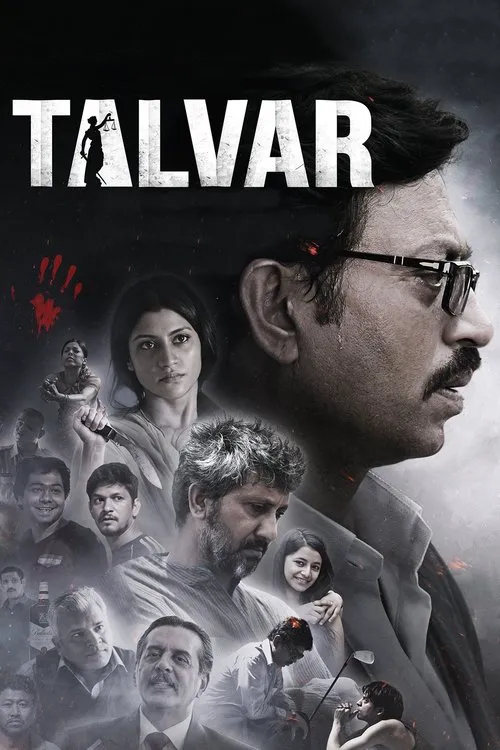Talvar

Enredo
Talvar, a Hindi-language crime drama directed by Meghna Gulzar, is based on the highly publicized and infamous murder case of Aarushi Talwar and her family's live-in servant Hemraj. The film is an adaptation of the events that transpired in the summer of 2008 in the affluent neighborhood of Jalvayu Vihar in Noida, Uttar Pradesh. The story revolves around three distinct perspectives - of the police, the government, and the parents of Aarushi, who were accused of brutally murdering their teenage daughter. The film begins with a montage of media coverage and the subsequent investigation that follows a shocking crime. The police, led by Superintendent of Police, Tapan Deshmukh (played by Irrfan Khan), arrive at the scene to find Aarushi dead with multiple stab wounds. The victim's mother, Nupur Talwar (played by Konkona Sen Sharma), is seen frantically searching for her daughter's body and seems overwhelmed by grief. However, soon after the murder, a more complex scenario unfolds as the police discover Hemraj's body in the nearby servant's quarters. The case takes a dramatic turn as Tapan Deshmukh becomes convinced that Aarushi's parents, Rajesh and Nupur Talwar, are hiding a dark secret. They appear too calm and composed, despite their daughter's murder, which piques Deshmukh's curiosity. The police start to investigate the Talwar family, looking for any signs of guilt or evidence that might reveal the truth behind the double murder. Meanwhile, the film also delves into the lives of the police officials involved in the case. DCP Tejaswini (played by Neeraj Kabi) is introduced as the higher authority who has to tackle the intense media scrutiny surrounding the case. On the other hand, Tapan Deshmukh's assistant, Ashwin (played by Shweta Tripathi), is introduced, showing a contrasting perspective as one of the officials is initially hesitant to believe that the parents are involved. The contrasting perspectives add depth to the story, highlighting the flaws and biases within the system. As the investigation proceeds, the police focus on the potential evidence against the Talwar family. However, it soon becomes apparent that every piece of evidence may be misleading or circumstantial. A key witness in the case, CBI officer, ACP Dinesh Tiwari (played by Rajesh Sharma), is introduced, who has to navigate through various layers of deceit and misinterpreted evidence. The case becomes increasingly complex, and it's unclear whether it's the police trying to frame the Talwar family or they might be genuinely involved. Rajesh and Nupur Talwar (played by Vishal Jethwa in his younger years), the parents of the victim, present an alternate and conflicting narrative of events. As the story unfolds, their side of the story comes into focus, revealing a complex web of emotions and relationships. They had been concerned about their daughter's growing proximity to Hemraj and feared a possible affair, which might be a motive for Hemraj's murder. The parents' perspective humanizes the case and makes the viewer question the true motives behind the murder. On the other hand, the government's perspective, represented by the Chief Minister and other influential politicians, pressures the police to solve the case quickly. The film highlights the immense pressure on the investigating officers, which could lead to biases and wrongful accusations. Through the investigation, the film raises a plethora of questions about the Indian justice system, particularly in cases involving influential families. It showcases how corruption, media frenzy, and power dynamics can sway the course of justice. The story also touches upon the emotional toll that such high-profile cases take on the families involved and the investigators. Ultimately, the case remains a complex enigma that raises more questions than it answers. While the film does not provide a clear verdict on the guilt or innocence of the accused, it presents a scathing critique of India's justice system. It encourages the audience to reflect on the system's flaws and the importance of evidence-based investigations. The film's conclusion leaves the audience questioning the truth behind the events that transpired on that fateful night. Did the Talwar parents have anything to do with the gruesome murders, or was it just a misinterpretation of the evidence? The ending raises more questions than it answers, inviting the viewers to make their own judgments.
Resenhas
Recomendações




